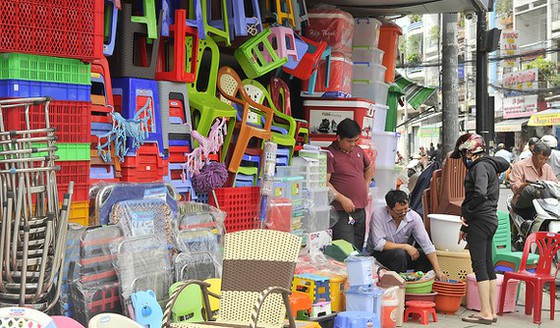It will help protect their rights and benefits better, foster them to reach full potential, and create a good environment for all Vietnamese businesses.

An economics experts has called for an independent law to be set up focussing on household businesses.
Phan Duc Hieu, deputy director of the Central Institute for Economic Management (CIEM), was speaking at a workshop in Ha Noi on Thursday.
Hieu supported the idea of releasing an independent law for household business – a unique business model that exists in a few countries including Viet Nam.
But in short term, that model should be managed by the Law on Enterprises, which was discussed at the 14th National Assembly’s eighth meeting, he added.
Hieu is also a member of the writers group that compiled the draft of amended Law on Enterprises.
The model of household business is already mentioned in the existing Law on Enterprises and Decree 78/2015/ND-CP dated September 14, 2015 to ruling business registration and management, he said.
“Basically, business household is a typical business model, so it must be monitored under a separate law, not a decree,” Hieu said.
The inclusion of household business management in the amended law will not have bad impact on households’ activities as they do not have to re-new their business registrations, he added.
It will help protect their rights and benefits better, foster them to reach full potential, and create a good environment for all Vietnamese businesses, he said.
“The group of law writers consider household business a rightful business model and it must be treated on a fair level with other types of business,” Hieu said.
“Household businesses must be enabled to become a big part of the economy with sufficient legal rights, benefits and obligations,” he said, adding they will be admitted as a part of the growing economy and limits will be removed for them.
Dau Anh Tuan, head of the Vietnam Chamber of Commerce and Industry's Legal Department, said the model of household business has been managed by a decree for a long time, and it must be legalised by a law.
“Household business is a unique model in Viet Nam and the sector has grown very big now,” he said.
The General Statistics Office during the NA meeting reported there are now a total of 5.2 million households doing business, representing 30 per cent of Viet Nam’s total production and creating ten million jobs.
“It is important that we don’t ignore the sector anymore. Limits must be removed to help household businesses get access to resources,” Tuan said.
Other specialists raised concerns about the risks that household businesses may face if they are regulated by the amended enterprises’ law.
According to CIEM’s former director Nguyen Dinh Cung, if household business is regulated by the amended law or a separate law, it will be hard for government agencies to fully execute the regulations.
Family members will be divided into different sides and legal rights will destroy family relationship. If worse, the sector will be ruined because households are no longer free to do business in their own way. — VNS





